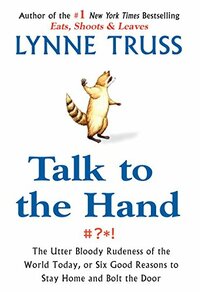Take a photo of a barcode or cover
funny
informative
inspiring
reflective
fast-paced
Lynne Truss covers the loss of morals in modern times. Somehow tying it on how we have become desensitized to rudeness over the years. As I was reading I felt called out a couple of times in between chapters, that I may have also contributed to a fraction of the population that is mean, the same way I would love to believe that I contribute at being kind. This book had me reflecting on my values and what I stand for, I’ll change my ways. “If we looked inside ourselves and remembered how insignificant we are, just for a couple of minutes a day, respect for other people would be an automatic result.”
I have written the review for this book about 100 times in my head, where I documented all sorts of rudeness and such, but it comes down to this - if you, as I, feel like somehow it has become ok and even endearing to be a belligerent a$$hole (as shown by some of the most popular Goodreads reviews and the comments section of the online version of your local newspaper) and you don't think that's a good thing, read this book and realize you aren't alone! Meanness isn't cool or endearing, so let's bring back a little civility to everyday life, shall we?
Very recommended.
Very recommended.
Quote:
“Politeness is itself a complicated matter. When it works, does it draw people comfortably together, or does it actually keep them safely apart?”
“Politeness is itself a complicated matter. When it works, does it draw people comfortably together, or does it actually keep them safely apart?”
Points of discrimination, pseudoscience and other nasty things. She seems like the kinda of person I would avoid
Some what more of a rant on personal difficulties with the rest of the world. But, I agree with these difficulties, so enjoyable.
The first half of this book really is a treat. Truss laments the state of manners while discussing their history, raising excellent questions about what manners mean in the twenty-first century, and does at all with considerable wit. But the second half feels more like a long, unstructured (though well-written!) ramble, complaining about who things are and how htey used to be without offering much in the way of concrete suggestions on how to make things better. Eats, Shoots & Leaves complained about misuse of punctuation, but did it while explaining the proper uses of it. Talk to the Hand doesn't really educate about good manners, so in the end what it adds up to is a whole lot of bitching.
I misunderstood the concept of this book. I thought it would be, like Eats, Shoots and Leaves, it would be more language or grammar based. Some interesting stuff here, though.
Here's my Lightning Round of Take-a-Ways:
The trouble with etiquette books is that there is no “bad manners” only “your manners” really. If you do something like write thank you notes, well then, that’s just good manners. If not, they’re old fashioned.
The effort is what’s important. The person who can’t read their own phone message for another person isn’t putting the effort in to communicate clearly.
She also hates computerized helplines because it puts the effort on you, not the company, to reach the right person. I’m not sure I agree with this one.
“Authority is largely perceived as a kind of personal insult which must be challenged.” (33)
“While you’re down there…” is a slogan referring to teenage oral sex on The Tube to pick up the litter, too. (36)
People have been complaining about manners since the 15th century. (51)
Computer menus make us do all the work. I disagree, here, too. The problem isn’t the work it’s the naming conventions being a personal word choice. (84)
Chapter 2 is all about how having too many choices is bad. I hear this quite often actually. The phrase “analysis paralysis” comes from this.
The Bubble chapter is railing against using cellphones for private conversations in public spaces.
The Effort chapter says that confrontations, even civil ones, are so rude, at least to the British. I wonder if my reading so much Brit Lit somehow subconsciously sunk this lesson into my poor little brain. It’s probably more due to my low self-esteem but still, interesting thought.
Is the EFF OFF! Reflex a symptom of the desire to never be wrong?
“Abuse is the weapon of the weak.” (151)
Politically correct language isn’t about respect it’s about fear of prosecution. I agree it can get to that point but it’s not black and white, sometimes it is about respect. Others, not so much. (164)
“Rules exist, it seems, but there are no rules about rules. This, in a nutshell, is the insanity of the modern condition.” (169)
“I aspire to be a zero-impact member of society.” Me too! (181)
Here's my Lightning Round of Take-a-Ways:
The trouble with etiquette books is that there is no “bad manners” only “your manners” really. If you do something like write thank you notes, well then, that’s just good manners. If not, they’re old fashioned.
The effort is what’s important. The person who can’t read their own phone message for another person isn’t putting the effort in to communicate clearly.
She also hates computerized helplines because it puts the effort on you, not the company, to reach the right person. I’m not sure I agree with this one.
“Authority is largely perceived as a kind of personal insult which must be challenged.” (33)
“While you’re down there…” is a slogan referring to teenage oral sex on The Tube to pick up the litter, too. (36)
People have been complaining about manners since the 15th century. (51)
Computer menus make us do all the work. I disagree, here, too. The problem isn’t the work it’s the naming conventions being a personal word choice. (84)
Chapter 2 is all about how having too many choices is bad. I hear this quite often actually. The phrase “analysis paralysis” comes from this.
The Bubble chapter is railing against using cellphones for private conversations in public spaces.
The Effort chapter says that confrontations, even civil ones, are so rude, at least to the British. I wonder if my reading so much Brit Lit somehow subconsciously sunk this lesson into my poor little brain. It’s probably more due to my low self-esteem but still, interesting thought.
Is the EFF OFF! Reflex a symptom of the desire to never be wrong?
“Abuse is the weapon of the weak.” (151)
Politically correct language isn’t about respect it’s about fear of prosecution. I agree it can get to that point but it’s not black and white, sometimes it is about respect. Others, not so much. (164)
“Rules exist, it seems, but there are no rules about rules. This, in a nutshell, is the insanity of the modern condition.” (169)
“I aspire to be a zero-impact member of society.” Me too! (181)
I just found it too frustrating. I remember really liking this book when I was younger, but now I find it to be a bunch of whingeing, self-centred nonsense.
You know, it's very easy to read Lynne Truss--she writes smooth and amusing prose, and you're halfway through the book before you realize that it isn't going ANYWHERE.
If this woman hadn't already written a bestseller that actually gives reasonable advice I don't *really* think any editor would have considered publishing this grouchy and extended rant about nothing. Half of it doesn't even have to do with politeness (her supposed topic), or lack thereof, but about the author's personal dislikes of the noise of apple chewing (or whatever). I totally agree with her on many occasions, but honestly, who wants to hear MY extended rants about personal space? Hers are just as tedious and fame doesn't really make them any more worth reading.
The shred of advice she gives--let's all try to be a little more polite--is well taken. But it didn't need over two hundred pages to say it and I can't imagine anyone's going to pay any attention.
yrs. sincerely,
grumpy woman who already knew where to put her apostrophes
If this woman hadn't already written a bestseller that actually gives reasonable advice I don't *really* think any editor would have considered publishing this grouchy and extended rant about nothing. Half of it doesn't even have to do with politeness (her supposed topic), or lack thereof, but about the author's personal dislikes of the noise of apple chewing (or whatever). I totally agree with her on many occasions, but honestly, who wants to hear MY extended rants about personal space? Hers are just as tedious and fame doesn't really make them any more worth reading.
The shred of advice she gives--let's all try to be a little more polite--is well taken. But it didn't need over two hundred pages to say it and I can't imagine anyone's going to pay any attention.
yrs. sincerely,
grumpy woman who already knew where to put her apostrophes


